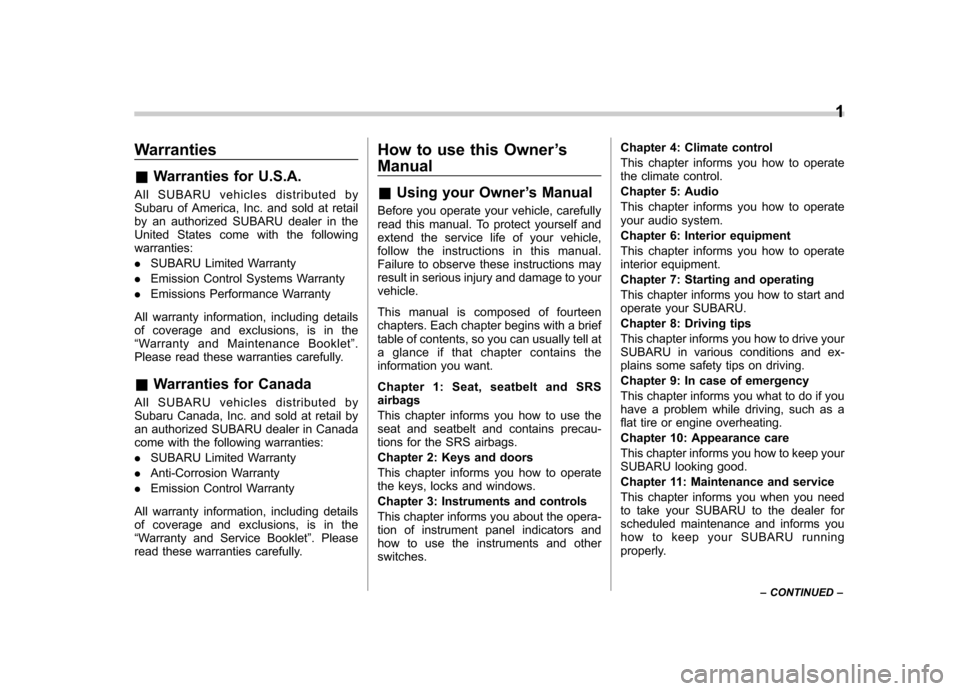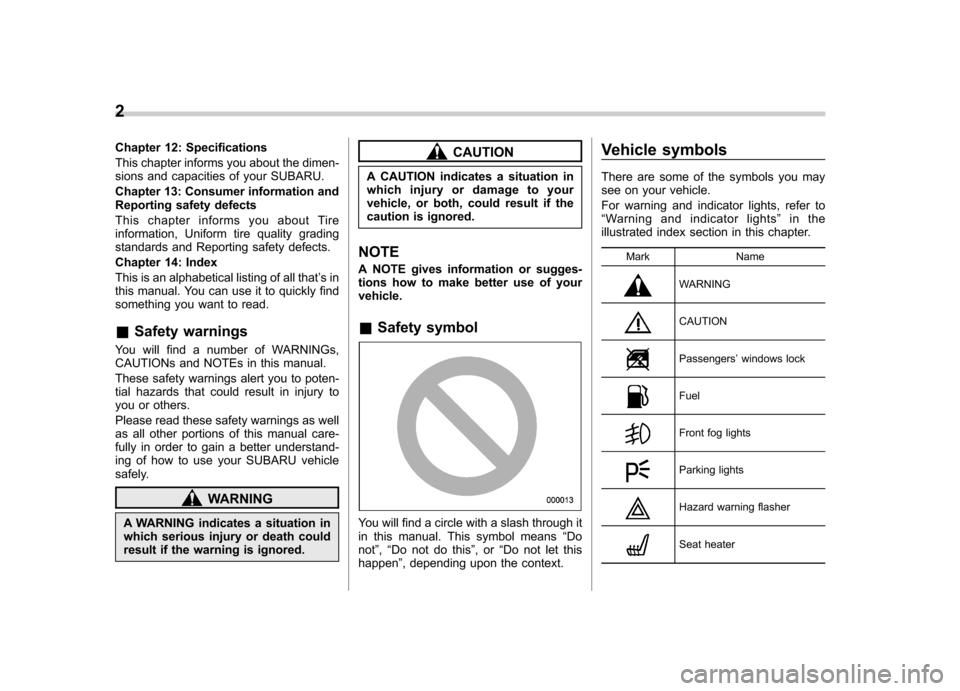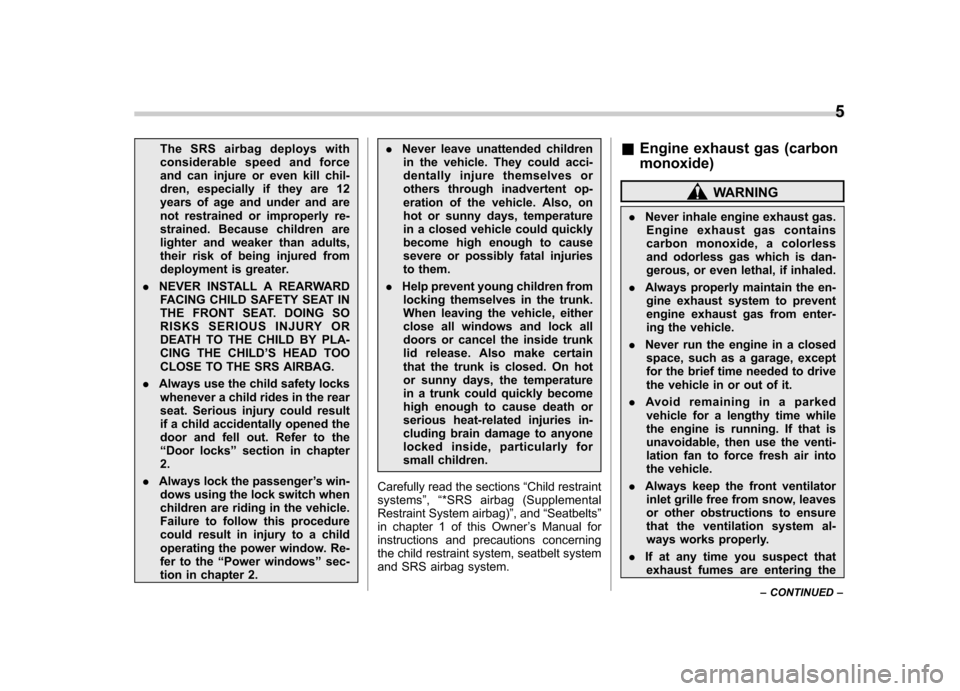Page 3 of 447

Warranties &Warranties for U.S.A.
All SUBARU vehicles distributed by
Subaru of America, Inc. and sold at retail
by an authorized SUBARU dealer in the
United States come with the followingwarranties: . SUBARU Limited Warranty
. Emission Control Systems Warranty
. Emissions Performance Warranty
All warranty information, including details
of coverage and exclusions, is in the“ Warranty and Maintenance Booklet ”.
Please read these warranties carefully.
& Warranties for Canada
All SUBARU vehicles distributed by
Subaru Canada, Inc. and sold at retail by
an authorized SUBARU dealer in Canada
come with the following warranties: . SUBARU Limited Warranty
. Anti-Corrosion Warranty
. Emission Control Warranty
All warranty information, including details
of coverage and exclusions, is in the“ Warranty and Service Booklet ”. Please
read these warranties carefully. How to use this Owner
’s
Manual & Using your Owner ’s Manual
Before you operate your vehicle, carefully
read this manual. To protect yourself and
extend the service life of your vehicle,
follow the instructions in this manual.
Failure to observe these instructions may
result in serious injury and damage to yourvehicle.
This manual is composed of fourteen
chapters. Each chapter begins with a brief
table of contents, so you can usually tell at
a glance if that chapter contains the
information you want.
Chapter 1: Seat, seatbelt and SRS airbags
This chapter informs you how to use the
seat and seatbelt and contains precau-
tions for the SRS airbags.
Chapter 2: Keys and doors
This chapter informs you how to operate
the keys, locks and windows.
Chapter 3: Instruments and controls
This chapter informs you about the opera-
tion of instrument panel indicators and
how to use the instruments and otherswitches. Chapter 4: Climate control
This chapter informs you how to operate
the climate control.
Chapter 5: Audio
This chapter informs you how to operate
your audio system.
Chapter 6: Interior equipment
This chapter informs you how to operate
interior equipment.
Chapter 7: Starting and operating
This chapter informs you how to start and
operate your SUBARU.
Chapter 8: Driving tips
This chapter informs you how to drive your
SUBARU in various conditions and ex-
plains some safety tips on driving.
Chapter 9: In case of emergency
This chapter informs you what to do if you
have a problem while driving, such as a
flat tire or engine overheating.
Chapter 10: Appearance care
This chapter informs you how to keep your
SUBARU looking good.
Chapter 11: Maintenance and service
This chapter informs you when you need
to take your SUBARU to the dealer for
scheduled maintenance and informs you
how to keep your SUBARU running
properly.1
– CONTINUED –
Page 4 of 447

2
Chapter 12: Specifications
This chapter informs you about the dimen-
sions and capacities of your SUBARU.
Chapter 13: Consumer information and
Reporting safety defects
This chapter informs you about Tire
information, Uniform tire quality grading
standards and Reporting safety defects.
Chapter 14: Index
This is an alphabetical listing of all that’sin
this manual. You can use it to quickly find
something you want to read. & Safety warnings
You will find a number of WARNINGs,
CAUTIONs and NOTEs in this manual.
These safety warnings alert you to poten-
tial hazards that could result in injury to
you or others.
Please read these safety warnings as well
as all other portions of this manual care-
fully in order to gain a better understand-
ing of how to use your SUBARU vehicle
safely.
WARNING
A WARNING indicates a situation in
which serious injury or death could
result if the warning is ignored.
CAUTION
A CAUTION indicates a situation in
which injury or damage to your
vehicle, or both, could result if the
caution is ignored.
NOTE
A NOTE gives information or sugges-
tions how to make better use of yourvehicle. & Safety symbol
You will find a circle with a slash through it
in this manual. This symbol means “Do
not ”, “Do not do this ”,or “Do not let this
happen ”, depending upon the context. Vehicle symbols
There are some of the symbols you may
see on your vehicle.
For warning and indicator lights, refer to “
Warning and indicator lights ”in the
illustrated index section in this chapter.
Mark Name
WARNING
CAUTION
Passengers ’windows lock
Fuel
Front fog lights
Parking lights
Hazard warning flasher
Seat heater
Page 5 of 447
Mark Name
Child restraint lower an- chorages
Child restraint top tether an- chorages
Horn
Windshield wiper deicer
Wiper intermittent
Windshield wiper and washer
Windshield wiper mist (for
single wipe)
Rear window wiper
Rear window washer
Lights
Parking lights, tail lights, li-
cense plate lights and instru-
ment panel illuminationMark Name
Headlights
Turn signal
Illumination brightness
Engine hood
Trunk lid (Sedan)
Fan speed
Instrument panel outlets
Instrument panel outlets and
foot outlets
Foot outlets
Windshield defroster and foot outlets
Windshield defroster
Mark Name
Rear window defogger/Out-
side mirror defogger
Air recirculation
Outside air
Engine oil
Washer
Door lock (transmitter)
Door unlock (transmitter)
Trunk lid (Sedan) or rear gate
(Station wagon) (transmitter)
3
Page 7 of 447

The SRS airbag deploys with
considerable speed and force
and can injure or even kill chil-
dren, especially if they are 12
years of age and under and are
not restrained or improperly re-
strained. Because children are
lighter and weaker than adults,
their risk of being injured from
deployment is greater.
. NEVER INSTALL A REARWARD
FACING CHILD SAFETY SEAT IN
THE FRONT SEAT. DOING SO
RISKS SERIOUS INJURY OR
DEATH TO THE CHILD BY PLA-
CING THE CHILD ’S HEAD TOO
CLOSE TO THE SRS AIRBAG.
. Always use the child safety locks
whenever a child rides in the rear
seat. Serious injury could result
if a child accidentally opened the
door and fell out. Refer to the“ Door locks ”section in chapter
2.
. Always lock the passenger ’s win-
dows using the lock switch when
children are riding in the vehicle.
Failure to follow this procedure
could result in injury to a child
operating the power window. Re-
fer to the “Power windows ”sec-
tion in chapter 2. .
Never leave unattended children
in the vehicle. They could acci-
dentally injure themselves or
others through inadvertent op-
eration of the vehicle. Also, on
hot or sunny days, temperature
in a closed vehicle could quickly
become high enough to cause
severe or possibly fatal injuries
to them.
. Help prevent young children from
locking themselves in the trunk.
When leaving the vehicle, either
close all windows and lock all
doors or cancel the inside trunk
lid release. Also make certain
that the trunk is closed. On hot
or sunny days, the temperature
in a trunk could quickly become
high enough to cause death or
serious heat-related injuries in-
cluding brain damage to anyone
locked inside, particularly for
small children.
Carefully read the sections “Child restraint
systems ”, “*SRS airbag (Supplemental
Restraint System airbag) ”, and “Seatbelts ”
in chapter 1 of this Owner ’s Manual for
instructions and precautions concerning
the child restraint system, seatbelt system
and SRS airbag system. &
Engine exhaust gas (carbon monoxide)
WARNING
. Never inhale engine exhaust gas.
Engine exhaust gas contains
carbon monoxide, a colorless
and odorless gas which is dan-
gerous, or even lethal, if inhaled.
. Always properly maintain the en-
gine exhaust system to prevent
engine exhaust gas from enter-
ing the vehicle.
. Never run the engine in a closed
space, such as a garage, except
for the brief time needed to drive
the vehicle in or out of it.
. Avoid remaining in a parked
vehicle for a lengthy time while
the engine is running. If that is
unavoidable, then use the venti-
lation fan to force fresh air into
the vehicle.
. Always keep the front ventilator
inlet grille free from snow, leaves
or other obstructions to ensure
that the ventilation system al-
ways works properly.
. If at any time you suspect that
exhaust fumes are entering the 5
– CONTINUED –
Page 12 of 447
10
Illustrated index &Exterior1) Engine hood lock release (page 11-4)
2) Headlight switch (page 3-46)
3) Bulb replacement (page 11-50)
4) Wiper switch (page 3-51)
5) Moonroof (page 2-28)
6) Roof rail (page 8-15)
7) Door locks (page 2-5)
8) Tire pressure (page 11-36)
9) Flat tires (page 9-4)
10) Tire chains (page 8-13)
11) Fog light switch (page 3-49)
12) Tie-down hooks (page 9-14)
13) Towing hook (page 9-13)
Page 13 of 447
1) Rear window defogger button(page 3-54)
2) Fuel filler lid and cap (page 7-5)
3) Child safety locks (page 2-21)
4) Tie-down hooks (page 9-14)
5) Towing hook (page 9-13)
6) Trunk lid (page 2-24)
7) Rear gate (page 2-27)
8) Bulb replacement (page 11-53)
9) Rear wiper switch (page 3-53) 11
– CONTINUED –
Page 16 of 447
14
1) Parking brake lever (page 7-44)
2) Gear shift lever (MT) (page 7-15/page 7-17)
3) Selector lever (AT) (page 7-19/ page 7-25)
4) Information display (page 3-41)
5) Clock (page 3-41)
6) Dashboard storage compartment (page 6-5)
7) Navigation system (Refer to the Owner ’s
Manual supplement for the navigation system.)
8) Glove box (page 6-5)
9) Hazard warning flasher switch (page 3-5)
10) Audio (page 5-1)
11) Climate control (page 4-1)
12) Pocket (page 6-8)
13) Accessory power outlet (page 6-9)
14) Tilt/telescopic steering wheel (page 3-59)
15) SI-DRIVE selector (page 7-32)
16) Cup holder (page 6-8)
Page 17 of 447
&Instrument panel1) Door locks (page 2-5)
2) Illumination brightness control
(page 3-48)
3) Remote control mirror (page 3-57)
4) Windshield wiper deicer (page 3-53)
5) Vehicle Dynamics Control OFF switch (page 7-42)
6) Audio control buttons (page 5-26)
7) Light control lever (page 3-46)
8) Combination meter (page 3-5/page 3-24)
9) Wiper control lever (page 3-49)
10) Paddle shift (page 7-28)
11) Cruise control (page 7-46)
12) S# switch for SI-DRIVE (page 7-33)
13) Horn (page 3-59)
14) SRS airbag (page 1-40)
15) Multi-information display operation switch (page 3-9)
16) Fuse box (page 11-47)
17) Hood lock release knob (page 11-4)
18) Power windows (page 2-21) 15
– CONTINUED –